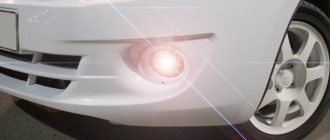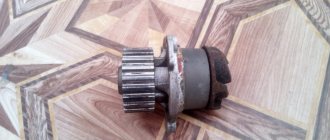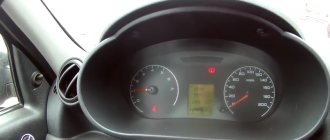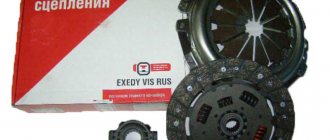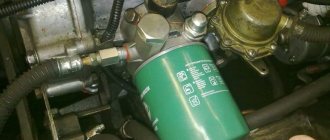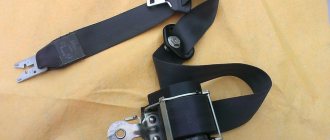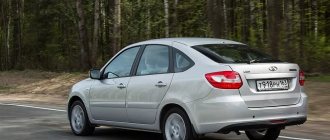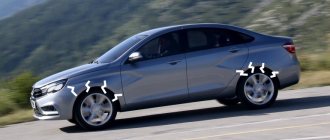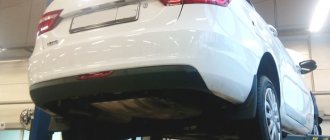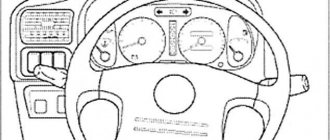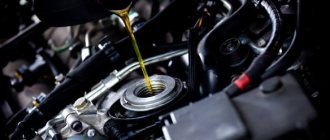Creaks in the cabin can make the most balanced driver lose patience. Let's consider the reasons for this annoying phenomenon and methods to combat it.
Chevrolet > Lacetti
LADA > Granta
LADA > Kalina
Renault > Logan
A creaking sound is a sound of a fairly high frequency, usually generated by the mutual movement of body parts and upholstery. The same sound is possible due to unintended mutual micro-movements of the instrument panel parts and the floor tunnel linings. Door trims, ceiling lights, and rear shelves can also creak.
Getting rid of squeaks in the cabin
Once upon a time, when the trees were big, I didn’t understand why car enthusiasts value soft dashboards. After all, the owner doesn’t feel them all the time—and you can’t tell the softness by looking at them.
My very first car, a Moskvich-2140, which I purchased new, had soft instrument panels and door trims, so I don’t remember any particular squeaks. But when, six years later, I changed it to M-2141, that’s where it all started. One day I was picking up passengers - a mother and daughter. So, on one of the many bumps in Moscow in the early nineties, the instrument panel vibrated and rumbled so threateningly that the child got scared, and the mother instructively said: “This is Moskvich, Masha.” Oh, and I was offended! But the woman was right: the car, in an amicable way, should not make extraneous sounds.
Well, now, from the height of accumulated experience and taking into account that the second decade of the twenty-first century is slowly coming to an end, we will still consider why the malicious “crickets” still do not leave our cars.
Of course, even now you hear squeaks mainly either in used budget cars or in models with hard and noisy plastic. Manufacturers of more expensive cars use plastics with a rough surface or Soft-Touch coating, which feels like rubber to the touch.
In cars with high mileage, a nasty squeak can also be produced by the seat, often the driver's seat. Please note that cars that have been in an accident and have been poorly repaired tend to be more creaky. And although an ordinary cricket sings its songs in the summer, in a car such sounds can be heard much more often in cold weather, when the plastic panels are completely tanned - as, indeed, are the latches with caps on which these panels are held.
Ways to fight
with malicious “crickets” there are basically only three:
- go to a professional for service without delving into the details;
- find and eliminate them on your own;
- Turn up the music in the car louder.
If you are a “hands-on” person, then the second method is suitable for you. Let's start looking for sound sources. At the same time, keep in mind that acoustics is a subtle science, and the paths of sound propagation are mysterious. It is not for nothing that sometimes it seems that the front wheel bearing is noisy, but in reality it turns out that the source of the noise is from behind.
Remove all items located in the glove box, armrest, door pockets and all other storage areas, including the eyeglass case. At the same time, check that all items in the trunk (spare tire and tools) are securely secured. Take it for a ride - perhaps the unpleasant noises have already been eliminated?
Weak points of the suspension
In wet weather it is not always possible to see a defect in the shock absorber strut
If you carry out independent repairs, for example, replacing a ball joint, then you must carefully tighten the fastening bolts. There are no through holes in the steering knuckle to which the support is attached: the bolt is screwed into the knuckle itself. Excessive tightening force may cause the bolt to break. A knock in the front suspension may also occur for this reason.
For reliable and long-term operation of the suspension, it is necessary to comply with the speed limit of the machine stated in its technical passport. Also, regular maintenance will help eliminate the appearance of noise, knocking and deviation from straight-line movement.
I noticed an incomprehensible knocking noise coming from the right side of the front of the car. Since I don’t have a pit at home, I went to the service center, where the guys said that my car’s ball joint had fallen off. Not the most expensive of car parts. The replacement also did not require large financial investments.
A knocking sound appeared when going over bumps on the front left wheel; also, when braking, the steering wheel pulls to the left, and when accelerating, to the right. We found out that the tie rod end has play on the tie rod side.
crickets in the car
It is possible that this will be the end of all the creaking. The polish, once in the gap, eliminates dry friction and the sound stops. True, only for a while. If you want to solve the problem radically, then you will have to dismantle the panel and carefully inspect it. Areas that cause squeaking will be marked by abrasions and a thin layer of wear debris - plastic dust. Now, having seen the enemy in the face, begin the fight. You can stick double-sided tape to the contact point: the connection will subside, but will become conditionally inseparable. By gluing the Velcro halves to the mating parts, we will also stop the mutual movement of the parts, while maintaining the possibility of disassembling the connection. Many sources recommend using the advertised “fungal” Velcro, but it seems to me that there are no such commonly disassembled joints in the car.
Which cars are structurally more prone to squeaking and which are not? Examples are in the photo below.
How to deal with a grinding noise on the front wheel of a Nissan Premiere
Thus, if a motorist experiences discomfort from piercing noise while driving, he needs to take the following steps:
- Stop the car, get out of it and gently rock it on the right and left sides. If he hears an extraneous sound under this influence, then there is almost certainly a problem with the suspension. Or rather, with the silent block of one of the shock absorbers. In such cases, as a rule, further operation of the car for short distances and on a flat road does not threaten anything, but if the driver completely neglects the problem, then consumable parts can fall apart and harm the entire system, which will lead to long-term, expensive repairs.
- If the Nissan does not make any sounds when rocking, then the problem lies in the brake system or hub. The best solution here would be to put the front-wheel drive car in neutral, lift it on a jack, and then carefully turn the wheel clockwise and back. If you hear a creaking noise, then there is 90% a problem with the bearing on the hub, and in this case you need to immediately go to the nearest tire shop or car service center, where the part will be replaced.
- If none of the diagnostic options led to results, and the sound was not detected, then the problem may only be hidden in the brakes, and the driver needs to change the pads, and it is best to purchase them in the original.
Friction of rubber on metal
Lada Kalina and Granta
You can stick a film on all surfaces of the door trim to prevent squeaking. The pistons, having already been removed and installed several times, may also not provide proper pressure to the upholstery, and they themselves may creak in their holes. Such pistons must be replaced. The most radical way to attach door trim is to install one or more self-tapping screws. You should use metal screws, install them in inconspicuous places and close the heads with decorative plugs sold in hardware stores.
How do you deal with squeaks? Are you fighting at all? Share your experience, colleagues!
Sound insulation of the Lada Granta is a special technological process that is necessary to reduce the penetration of extraneous sounds into the car’s interior, as well as reduce the level of noise of various origins. Sound insulation is one of the important steps in tuning a vehicle, which you can master on your own, because things made by yourself are of much better quality. Treating the Lada Granta car with noise-insulating materials gives the vehicle anti-corrosion properties and ensures passive safety.
Video and sound insulation of Lada Granta
What material is used to eliminate squeaks?
- bitoplast;
- anti-creak
Few owners know the use of each material; they are often considered identical, but this is not so.
Anti-creak is often called “madeline”, after the same name of the component included in the main composition. Madeline is a thin material, not intended for noise and vibration insulation. Suitable only for eliminating squeaks.
Bitoplast - also known as “Shumka”, has a thick fiber structure, is used primarily to reduce noise and vibration levels. It is not used as an anti-skripin. Although they sell it in stores as a universal remedy, which is fundamentally wrong.
Habitats of "crickets"
The area of origin of the grinding can be very diverse. Most often, crickets are found in:
- Dashboard and dashboard. The cause of the squeak is the fastening of several component parts of the device. To get rid of the sound, qualified intervention by specialists is required.
- Places for attaching attachments - glove box covers, fuse box, clock, diffusers, etc.
- Luke. The issue of sonority can be quickly and effectively resolved by using silicone or double-sided tape.
- Seat belts (latches). They arise due to twisting of the belts and contact of their latch with the plastic of the interior.
- Spoiler. Characterized by a specific itching sound.
- Doors. It is distinguished by a pronounced rattling sound under the door trim. Crickets also live in door gaps.
- Velvet door seals. In this case, the sound takes on a kind of rubber squeak.
- Seats. The sources of grinding noise are often headrests and seat fastenings due to wear and tear of the structures or weakening of their holders and bolts.
- Trunk and trunk curtain. The most common places for squeaks are the curtain mechanism or its fastening, drawers under the floor, hinges or door seals.
The method of getting rid of annoying crickets directly depends on the source of their spread. With the right approach to the matter, you can forget for a long time about the exhausting creaking inside the car.
Other causes of squeaking when driving a car
It happens that drivers feel extraneous squeaks or noises while driving a vehicle, but none of the above reasons are suitable for diagnosis, and the real reason for the problem lies in something else. So, among the most obvious reasons are the following:
- The main problem often lies in overinflated tires, because the driver or tire mechanic may have forgotten to look at the recommended pressure parameters in the cylinders before inflating the air. Thus, if the tire is given a pressure of 2.6 atmospheres instead of the recommended 2.4, this may lead to squeaking while driving when the surface rubs against the asphalt and especially when cornering.
- If your car has winter tires or studs, then when driving fast on a hard surface they will definitely knock on it, causing a lot of noise, and the higher the speed, the stronger it will be felt in the cabin. The same applies to Velcro, because it will begin to make squelching sounds on the asphalt or the front wheel of the car may squeak.
- If the car is driven off-road, the owner may feel some kind of knocking on every bump. This means that the suspension ball elements or arms on it have become loose or worn out and require prompt diagnosis, and then repair or replacement.
Hub wear
- It happens that the wheels are selected in such a way that their radius, profile or width do not meet the permissible limits from the vehicle manufacturer. It is in such cases that, as a rule, the tire hardly fits under the wheel arch, and when driving, the treads rub against the stationary parts of the car, which leads to noise and causes rapid wear of all parts rubbing against each other.
- The last thing that can cause tires to squeak on wheels is new tires that are still covered with a layer of oil, and the car is driving on perfectly smooth asphalt or a polymer parking lot surface. This effect of new wheels disappears within 100-200 km after their installation.
A few words about the suspension
The suspension system is a technically complex unit connecting the supporting structure of the car and the road surface. While the car is moving, the suspension takes on most of the load. This refers to road unevenness:
The vehicle suspension plays the role of a “mediator” or stabilizer of large physical forces in different vectors.
Where are IDNs (artificial road humps) most often installed?
A speed bump is installed to force a reduction in the speed limit in crowded places when crossing the roadway, namely:
- In parking lots.
- Near clinics and hospitals.
- School
- Kindergartens.
- Near pedestrian zones.
- In the courtyards.
- And also on roads with heavy vehicle traffic. Including freight and public transport.
- IDNs are often installed on roads where heavy traffic of passenger cars predominates.
- In parking lots, in front of supermarkets, and so on.
When installing a speed bump, responsible enterprises are required to install a special sign.
Grant Front Suspension Repair Video
In Garage: Repair of front suspension of Lada Granta
The time has come to replace the silent blocks in the front suspension of our grant and we decided to devote a little time to this.
Elimination of KNOCKING IN THE SUSPENSION. Replacement of the ball joint LADA GRANTA
The cause of the knocking turned out to be the ball joints, after replacing them the knocking went away - the car began to drive like new).
Major repair of the front suspension of Lada Kalina
The front suspension of the Lada Granta in motion.
A look from below at the operation of the front suspension of the Lada Granta in motion. #goodavto #ladagranta.
How to replace the silent block in the lower VAZ lever yourself, a simple method.
THIS VIDEO IS NOT A TRAINING VIDEO. Do-it-yourself VAZ 2108 silent block remover made from trash. The time has come.
Repair of the front suspension of my Lada Granta
The first time I climbed into the harness. Mileage 75,000 km. This is the second time I've changed the upper strut bearing. Hope.
Lada Kalina front suspension repair, support support replacement
Checking the car suspension, do-it-yourself diagnostics
An excellent scanner for diagnosing any CAR. Simple diagnostics, wheel bearings, steering.
Front suspension of VAZ 2110. What is included? What should I change?
Front suspension of VAZ 2110. What is included? What should I change? Almost the entire front suspension is on the table, except for the control arms.
replacing a VAZ ball joint and how to determine wear
The Auto_Repair channel will help you troubleshoot your car yourself.
Inspection of the caliper (guides and boots) on Priora, Kalina, Grant and 2110, 2114
Lubricating caliper guide pins, replacing pins and boots, video review of repairs. For all cars.
Replacing rubber bands and stabilizer brackets for VAZ 2112
The video shows the process of replacing stabilizer rubber bands and stabilizer brackets on a VAZ 2112 car.
Replacement of ball joints, stabilizer struts, brace bracket for Lada Granta, Priora, Kalina
In this video you will learn how to replace ball joints, extension joints, and arm joints.
Replacement of the front beam of VAZ 2108 2110 2170 Priora Kalina with polyurethane salen blocks
Do-it-yourself replacement of the front beam of a VAZ 2108 2110 2170 Priora Kalina with polyurethane salen blocks.
Replacing stabilizer struts on SS20 Priora VAZ
Subscribe to the group on VK.
Replacement of front struts, supports and springs of VAZ 2110, 2112, Lada Kalina, Granta, Priora, 2109
Video guide on how to independently replace front struts, supports and springs on front-wheel drive cars.
knocking in the front suspension on Kalina
all about repairing the Lada Kalina; knocking in the front suspension on the Lada Kalina (one of the reasons); own suspension repairs.
Lada Granta, spare parts for front suspension.
Diagnostics of the front suspension of VAZ 21099: it also drives itself
In this video we will show you how to check the front suspension on a VAZ 21099, VAZ 2109. This is the case when.
Do-it-yourself repair of the VAZ 2110-12 front suspension. (Replacement of ball joints and silent blocks of “Daisies”).
In this video, my first experience of independently replacing ball joints and silent blocks of VAZ front control arms.
Rear suspension of Lada Kalina: replacing rubber silent blocks with polyurethane ones.
Installation of polyurethane suspension in St. Petersburg on any cars with an official guarantee.
REPAIR OF SUSPENSION FOR VAZ / REPAIR OF FRONT SUSPENSION / VAZ 2114 / VAZ 2113 / VAZ 2109 / LADA
Social networks This video will repair the front chassis.
Installation of independent suspension on a VAZ – Avtoproduct
Rear independent suspension for front-wheel drive VAZ cars: – Stable.
How to replace the silent blocks of the front levers of a VAZ 2109-2114.
I came in for repairs on 21099 to replace the suspension silent blocks.
Replacing the front struts on a VAZ Priora with collapsible ones
Replacing the racks on the Priora with collapsible ones, softer and more comfortable. We install collapsible racks on the Priora.
Replacing the silent blocks of the VAZ front arm
Replacement of silent blocks of the front lever VAZ 2108,2109,21099,2110,2111,2112,2113,2114,2115 LADA Kalina, LADA Priora, Granta! If.
Replacement of daisies and silent blocks of VAZ 2110
Replacing the steering rack bushing for VAZ 1118 Kalina
– Spare parts without intermediaries. Compare prices for auto parts from 2000 sellers, choose the best offer.
Replacement of strut supports and steering tips for Lada Granta, Kalina, Priora
The video shows the products, you can get more detailed information about the product.
Front suspension strut support for VAZ 2190 upper with SEVI electric booster
In this video we look at the front suspension strut support of a VAZ 2190 with electric power steering with Vologda.
For beginners in the auto business. How to diagnose the front suspension of a car yourself.
For beginners in the auto business. How to diagnose the front suspension of the car. Those who recently bought a car are wondering. Of course.
Source: mixrolik.ru
| 1 — cover; 2 — ball joint; 3 - retaining ring; 4 — hub bearing nut; 5 — protective cap; 6 — hub; 7 — hub bearing; 8 — steering knuckle; 9 — front wheel brake disc; 10 — brake mechanism shield; 11 - nut; 12 — eccentric (adjusting) bolt; 13 — rotary lever; 14 — front suspension spring; 15 — shock absorber rod; 16 — upper spring cup; 17 — upper support of the shock absorber strut; 18 — shock absorber rod nut; 19 — bearing of the upper support of the shock absorber strut; 20 — spring gasket; 21 — front suspension compression buffer; 22 — protective casing; 23 — telescopic stand; 24 — front wheel drive shaft; 25 — bracket for mounting the anti-roll bar cushion; 26 — front suspension stretch; 27 — anti-roll bar; 28 — stabilizer bar; 29 — front suspension arm |
|
Other reasons
Of course, there are many minor problems that were not described here and that lead to noise when turning the steering wheel of the Lada Granta. When knocking and squeaking noises appear when turning the steering wheel, the Granta should be examined by specialists if you are not confident in your experience in diagnosing the car. Otherwise, you risk breaking the car.
Comfort when driving a Lada Granta car consists of many factors, one of which is the operation of the front suspension. Knocking, noise, and “breakdowns” of the suspension also affect traffic safety, so timely diagnosis of breakdowns of this unit is simply necessary. It is better to carry it out at a service center, but some faults can be identified yourself.
Exhaust pipe
Another rare case is that the hum under the car appears in a certain engine speed range. In this case, it is necessary to check the fastening of the exhaust pipe. Perhaps she leaned close to other elements of the car. This situation is explained by the physical phenomenon of resonance. When the vibration frequencies of the engine and the pipe coincide, it significantly increases its vibrations and can hit other components of the machine. This is perceived by sound as rattling or humming.
Probable causes of suspension malfunction
View of the front suspension “from under the wheel”
The unpleasant creaking of the front suspension of the Lada Grant, “breakdowns” in its operation lie in the malfunction of the elements of this component of the car. Conventionally, they can be divided into two groups: the shock absorber strut with its contents and all the rest. The reason for separating the strut into a separate category is due to the increased load on it: it simultaneously performs the function of an upper arm and dampens vertical vibrations of the wheel.
The main causes of malfunctions of the telescopic stand include the following:
- Loosening of the attachment of its upper support to the supporting body.
- Destruction of the rubber buffer.
- Liquid leakage from the shock absorber, scuffing on its rod, damage to the chrome coating of the rod.
The shock absorber is leaking (needs replacement)
In the photo: lower lever assembly with ball
Damage to the ball joint is also possible, usually caused by an overestimated service life or the installation of a substandard part. Worn rubber bushings in the stabilizer and braces will also affect the smoothness of the suspension. Breakage of the main spring is unlikely, but natural wear or installation of a non-standard model can cause a loss of elasticity of the suspension as a whole.
Self-diagnosis of faults in the front suspension
There are several explanations for even one symptom of a breakdown, so it is better to identify the true cause of the malfunction at a bus station.
The following groups of signs of deviations in the operation of the front suspension can be distinguished:
- Spontaneous deviation from straight-line movement, “yaw” of the machine.
- Noises, knocks, “breakdowns” when driving on uneven roads.
- Reduced service life of suspension elements, their rapid failure.
The paint on the stand has come off and the stand has begun to rust.
The first group usually includes malfunctions of the stabilizer. You can visually inspect the entire suspension and, if there are no signs of dents or deformations, then it is worth checking the setting of the toe-in/camber angles of the front wheels. Externally, their deviation is observed in the uneven wear of the tread of the front wheels, but it will take some time for the tires to wear out.
There is a chance to detect this failure by ear: when entering a turn, you will hear the creaking of rubber, and the steering wheel usually does not return to its original position on its own.
A creaking sound in the front suspension is one of the temporary malfunctions of a Lada Granta car if it is caused by operating the car on a polluted or sandy road. In this case, sand particles may get into the rubber seals (silent blocks) of the stabilizer or braces. After washing the noise disappears.
The “couldn’t be simpler” suspension is just a plus.
The suspension is “simple to the point of disgrace”, a crab, a strut, a lower ball, two silent blocks - and that’s it, that’s all its capital.
After any work that involves disconnecting the hub from the strut, it is necessary to do a wheel alignment. As a last resort, you can try using a chisel to make marks on the strut and on the camber bolt (it's on top).
Using winter tires in summer
Winter tires usually have a larger tread, and some models are even studded. Driving a car with such tires on warm asphalt is accompanied by additional noise. When not only a hum occurs, but also other negative factors, in particular, the studs and tread are damaged and wear out greatly.
In rare cases, steering wheel vibration may occur. Getting out of this situation is quite simple - you just need to replace the tires with summer ones in accordance with the regulations. However, there is no need to change it in the winter just during short-term warming; this should be done in the spring, when permanent warm weather sets in! After changing tires, do not forget to balance the wheels.
New Lada: How to check the engine temperature of the Lada Granta
Grinding noise in the wheels when driving a Kia Rio
Kia Rio is one of the most common compact budget foreign cars in Russia, which was immediately loved by many due to the fact that a worthy alternative to the domestic Lada or the long-produced Lancer appeared on the market. But as in many similar brands, where the manufacturer thought most of all about reducing costs, this model also has a number of problems, and one of them is noise or creaking in the wheels while driving that appears after a short period of use, the reason for which lies in the following facts:
- These cars have very weak silent blocks and stabilizer bushings on the suspension, and in cold seasons cracks may form; when driving, the car will make an unpleasant grinding noise until the consumables are replaced.
- Just as in the above cases, wear of the pads, failure of the bearing on the hub, defects in the calipers, or banal corrosion of the interface between the rotating part and the stationary part are possible. The methods for solving the problem remain the same.
- If, when braking, a strange gurgling sound appears on the Kia Rio or something similar to the grinding of two pieces of metal against each other. In this case, drivers should not be afraid, since the ABS system, built on the basis of fairly cheap elements, as a rule, cannot be perfect and, accordingly, does not have all the noise-absorbing elements installed on business and premium class cars.
What are the best rack supports for Granta?
The main requirements for Granta and Kalina 2 support bearings are endurance and reliability. The support bearing takes the entire load from the car body, as well as from the shock absorber strut, allowing the latter to rotate freely around the longitudinal axis.
Grants support bearing diagram
The dynamic loads of the shock absorber rod are absorbed by a rubber damper. The more reliable it is, the longer the support will last. The spring rests against a support cup with a rubber-coated ball support bearing. However, different manufacturers offer different solutions for support.
Thus, some supports are produced with reinforced bearings (balls of larger diameter), there are supports with a changed caster angle. To do this, the axis of the shock absorber strut is shifted by 6 or 12 mm, which ensures a change in the caster angle to 1°40′ or 2°45′, respectively.
In addition, supports are produced both for Lada Granta and Kalina 2 with electric power steering (article 21900-2902821-10), and for cars without electric power steering (article 21900-2902821-00).
Standard supports cost about $12 apiece, owner reviews about them are not the most encouraging, so most often you have to buy replacements for the original:
- Support bearing SS20 series Master, Gold, Drive, differ in caster angle and damper design. They last quite a long time and are easy to install. The price is about 26 dollars per piece.
ANVIS 2190
Rack Mounts , $27/pair, 6mm offset. Available for both Granta and Kalina 2 with and without EUR. Compatible with all types of springs (11190 or 11196), as well as the most popular KAYABA or SACHS struts. Sevi thrust bearings starting at $20 per pair. A budget option with the strut tilted by 1 degree and the shock absorber axis shifted back by 6 mm. Demfi , article number dff21901 (2190-2902822-12), are sold without a support bearing, which has catalog number 1118-2902840 . The price is about 15 dollars. Reviews are contradictory.
Technologies of the future , article number 2192-2902821 , price about 26 dollars per pair. There are few reviews, mostly positive. Budget Slovak supports LSA , sold without bearings, price about $10 per pair. supports (SA 0156) , complete with bearing, price 10 dollars apiece, run well, good assembly, bearing of standard sizes.
The grinding noise constantly intensifies and is quite sharp.
One of the most common situations in which you will need to use the help of specialists at a service station is an increase in grinding or a sharp, strong sound of metal rubbing against metal. Most likely, the block is completely worn out; you continue to brake with the sole of the block, which is made of hard metal. If this problem is not addressed promptly, the brake disc may fail and require replacement. In this case, repairs will be three times more expensive, so it is better to immediately identify all possible malfunctions and problems that caused the grinding noise. In particular, to diagnose this problem, it is enough to carry out the following processes:
- determine from which side the grinding sound is heard, this will help you halve the amount of work required for diagnosis;
- remove the wheel that you suspect is making unpleasant sounds when braking;
- examine the exposed brake disc for grooves, chips and other problems with the working surface;
- look at the remaining layer of the brake pads, determine the degree of wear and the need for replacement;
- also examine the second wheel on this side, and best of all, examine the braking system on all wheels;
- Identify possible problems that could lead to squeaking and consult with specialists.
